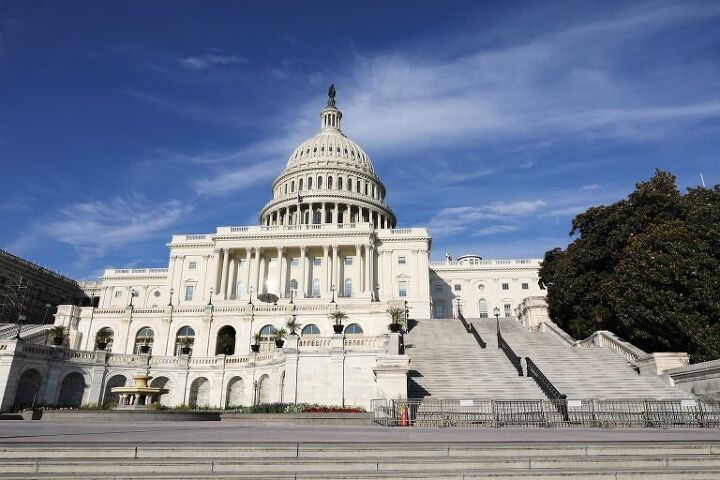#UnitedStates-Mexico-CanadaAgreement
Canada Joins Mexico in Trade Dispute Against United States
Mexican and Canadian officials have been dropping hints that they’re not all that enthusiastic about the United States-Mexico-Canada Agreement (USMCA) since before Enrique Peña Nieto, Donald Trump, and Justin Trudeau all sat down to sign it in 2018. But just getting to that point required months of formal negotiations that rarely looked to be all that productive.
Sadly, things don’t seem to have changed now that the USMCA is in full effect. Last week, Mexico requested a dispute settlement panel under the terms of the trade pact to help resolve disagreements about the surprisingly contentious automotive content stipulations that determine whether or not vehicles and parts will be slapped with tariffs. Under the previous North American Free Trade Agreement (NAFTA), 62.5 percent of the vehicle’s components had to be sourced from member nations to be considered tax-exempt. In an effort to spur localized production, USMCA increased that number to 75 and not everyone is thrilled with the updated content requirements with Mexico claiming it’s not even sure how to apply them. Canada now intends to formally sign onto Mexico’s complaint against the U.S. over their divergent interpretation of rules.
U.S. and Mexico Can't Come Together On Light Vehicle Rules
When the United States abandoned the North American Free Trade Agreement (NAFTA) to embrace the United States-Mexico-Canada Agreement (USMCA), it did so under the premise of crafting a better trade arrangement for itself. Established in 1994, NAFTA created a trilateral trade bloc that encouraged commerce between nations. But critics have accused it of encouraging the offshoring of U.S. jobs and dramatically suppressing wages — particularly within the automotive and manufacturing sectors.
Signed in 2018, and revised the following year, the USMCA was supposed to remedy those issues. But it’s been difficult to get all parties on board, especially when it comes to those persnickety rules of origin that stipulate how much of a vehicle’s hardware needs to be sourced from member nations.
Auto Lobbyists Attempt to Soften USMCA, Look to White House [UPDATED]
Lobbyists are reportedly seeking to soften the United States-Mexico-Canada Agreement (USMCA) now that there are some new faces in the White House. Signed in 2018, revised in 2019, and effective since 2020, the USMCA sought to restore North America’s manufacturing base with new content requirements and place the United States in a more favorable position than it held under the North American Free Trade Agreement. But industry groups are now claiming that interpretations from government agencies are gumming up the works, and accusing the U.S. of having a different interpretation from what the other nations had originally agreed upon.
“[The USCMA interpretation makes] meeting the … content provisions that much more difficult for everyone to achieve,” stated David Adams, president of Global Automakers of Canada.
Senate Approves USMCA Trade Deal Replacing NAFTA
The U.S. Senate approved changes to the North American Free Trade Agreement on Thursday, effectively replacing the 26-year-old deal with the new United States–Mexico–Canada Agreement. USMCA embraces stronger automotive content rules for the region, updates language for new technologies, and enacts sweeping labor protections aimed at uplifting the Mexican workforce. As a byproduct, it’s also likely to discourage automakers from isolating themselves south of the U.S. border in an effort to secure cheap labor.
Passing with a 89-10 vote in the Republican-controlled Senate, USMCA also allows President Donald Trump to keep his campaign promise of replacing NAFTA — a pact he often referred to as “the worst deal in history.”
U.S. Trade Head to Meet With UAW This Week Over New Trade Deal
U.S. Trade Representative Robert Lighthizer will be in Michigan this week to meet with union leaders from United Auto Workers in a bit to gain their approval for the Trump administration’s new North American free trade deal. Lighthizer is scheduled to meet with union officials in Dearborn on Tuesday to answer questions about the United States-Mexico-Canada Agreement (USMCA) while simultaneously drumming up support.
The USMCA deal suggests increasing existing requirements for North American content for vehicles, stipulating that 40 percent of a vehicle’s overall content be manufactured in areas paying at least $16 an hour, while also encouraging Mexico to tailor its labor rules to allow unions to wield legitimate collective bargaining powers.

![Auto Lobbyists Attempt to Soften USMCA, Look to White House [UPDATED]](https://cdn-fastly.thetruthaboutcars.com/media/2022/07/19/9146752/white-house-invites-auto-execs-to-endorse-build-back-better.jpg?size=720x845&nocrop=1)














Recent Comments